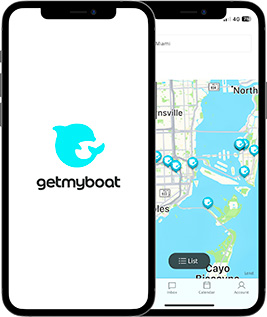Detroit, situated on the Detroit River between Lake St. Clair and Lake Erie, is a prominent city in the Midwestern United States and the most populous in Michigan. Renowned as a hub for industry, commerce, and culture in the Great Lakes region, Detroit provides ample opportunities for boating enthusiasts, catering to both powerboating and sailing. The Detroit River, a sought-after destination for recreational and commercial boating, is complemented by numerous conveniently located marinas and boat launches, enhancing the overall appeal of boating in the city.
Every Getmyboat operator must adhere to and take responsibility for operating in accordance with local guidelines. This involves acquiring appropriate registrations, passes, permits, and meeting all vessel and captain requirements. It also entails utilizing designated docks and approved boating areas for commercial activities, while complying with any additional stipulations outlined by local laws and facility regulations. To help Getmyboat operators comply with all applicable regulations, we have gathered the following essential details for boating in Detroit:
Boater Education Certificate:
In Michigan, anyone born after July 1, 1996, is required to complete a state-approved boater safety course before operating a motorized vessel. Additionally, individuals born after December 31, 1978, must complete a personal watercraft (PWC) safety education course to operate a PWC. A boater education certificate, which serves as proof of completion, must be carried by boaters while operating a vessel.
Watercraft Registration and Titling:
In Michigan, all boats must be registered with the Michigan Department of State and display a valid registration decal. This includes boats that are 16 feet or shorter, powered by oars or paddles, and not used for rental or commercial purposes. However, non-motorized vessels such as canoes, kayaks, rafts, surfboards, sailboards, and swim floats are exempt from registration, regardless of their length.
Boats that are 20 feet or longer in length or have a permanently affixed engine must also have a title. Upon the owner's request, titles can also be issued for watercraft not legally obligated to have one, allowing for the inclusion of a lien-holder in the record.
Insurance:
Adequate insurance coverage is crucial for protecting your business from potential liabilities arising from vessel operations. Our experienced partner,Boat Charter Insurance , can craft a customized insurance plan tailored to your unique needs.
USCG Captain’s License:
To operate a charter or passenger vessel, boat captains must hold a valid US Coast Guard (USCG) license that matches the vessel's size and type. For boats carrying up to six passengers, a 6-pack license is required, while vessels accommodating more than six passengers demand a Master Captain's license. As the captain, you bear the ultimate responsibility for the safety of both the vessel and all passengers on board. To learn more about captain's licenses, visit the Mariners Learning System website. Use the code GETMYBOAT10 to receive a 10% discount.
Certificate of Inspection (COI):
Operating commercial passenger boats on Lake Michigan demands unwavering adherence to safety protocols. To ensure the well-being of passengers, the Coast Guard Certificate of Inspection (COI) serves as a cornerstone of safety compliance. This certification rigorously evaluates vessels, ensuring they meet stringent safety regulations and are equipped with lifesaving gear, including fire extinguishers and life jackets. Furthermore, the COI mandates adequate staffing with qualified crew members capable of navigating the vessel safely. For more in-depth information, please refer to the USCG website.
Recreation Passport:
An annual permit, the Michigan Recreation Passport provides entry to state parks, recreation areas, state forest campgrounds, designated boating access sites, and state-designated trailheads. It also includes daily parking privileges at these locations and is available for purchase at any DNR Service Center.
Business License:
To engage in business activities, including boating, within the City of Detroit, securing a mandatory business license is necessary. The process of applying for a business license, which encompasses boating operations, can be conveniently accomplished online through the City's official website.
Passenger Pick Up/ Drop Off:
Detroit provides various choices for commercial boating passenger pickups. Before making your arrangements, ensure to verify the pickup and drop-off policies with the marina or dock. Here are some popular options:
- William G. Milliken State Park Harbor: Loacated at 1900 Atwater St, Detroit, MI 48207
- Hart Plaza: Located at 1 Hart Plaza, Detroit, MI 48226 Hart Plaza's dock can be reserved for commercial boating operations with prior approval.
Additional Details:
- Charter boats are required to possess a capacity certificate indicating the maximum allowable number of passengers, issued by the DNR or an authorized inspection agency.
- Boats must be equipped with a comprehensive array of safety gear, such as life jackets, fire extinguishers, first aid kits, and visual distress signals.
- Individuals renting PWCs from alternative providers must hold a valid boating safety certificate specific to PWCs.
- All commercial vessels must be furnished with a functional VHF radio and adhere to pertinent traffic signals and regulations.
- Emergency equipment: All commercial vessels must be equipped with a fire extinguisher, a first aid kit, a sounding device, a whistle, and a bell.
- Life jackets: All commercial vessels must have a life jacket for each person on board.
Kindly be aware that this overview provides a general summary of boating regulations in Detroit, Michigan. It may not encompass all relevant rules and permits, as specific regulations can differ based on the nature of the activity. To obtain a more thorough understanding of the regulations, we recommend consulting the Department of Natural Resources (DNR) and the City of Detroit.















